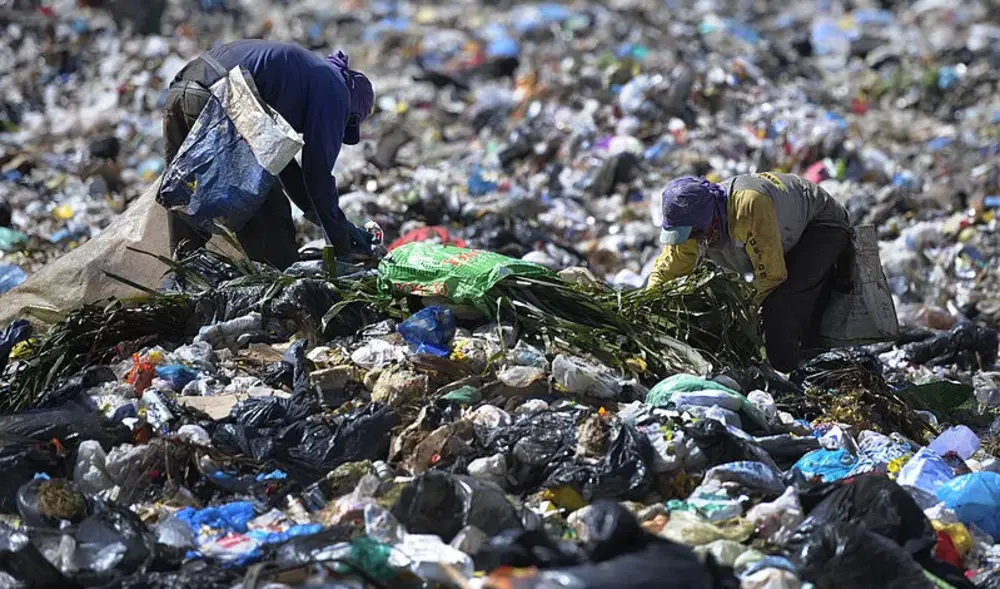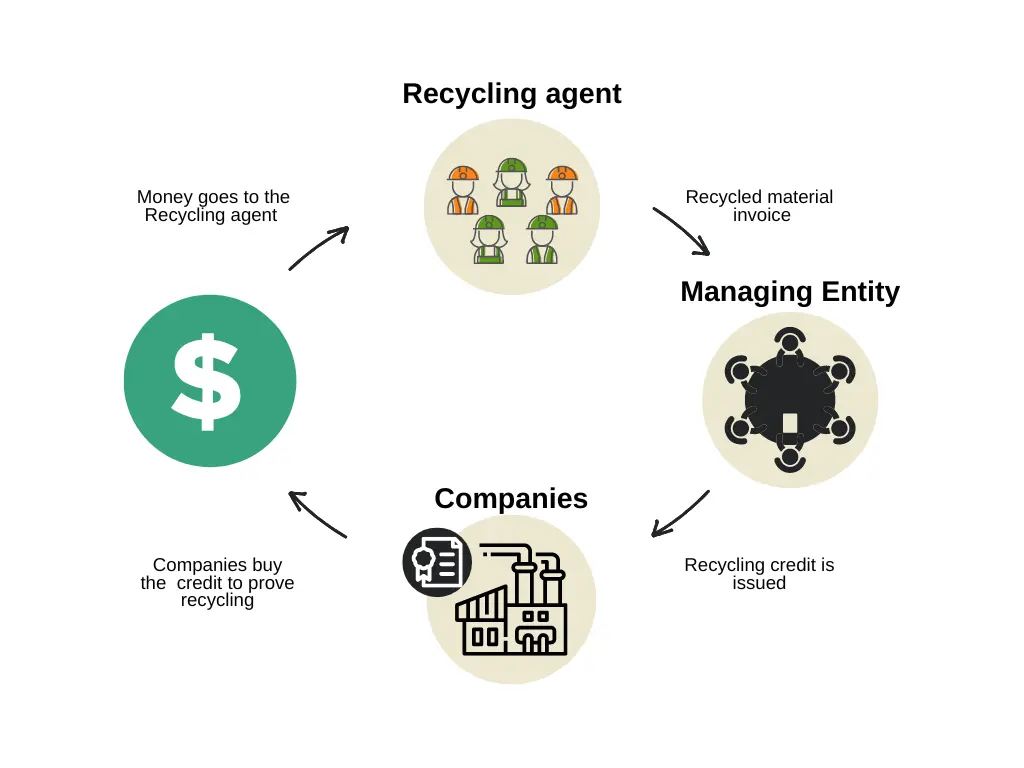Can I pay with trash? Recycling credits: The new Brazilian strategy to improve waste management

Garbage production has affected humanity in proportions never seen before. Waste management plays a vital role not only in the transition to a circular economy, but also in tackling climate change. The challenge is even bigger in developing countries due to the lack of infrastructure, but the Brazilian bet on a market-based solution can give us some insights into the problems and how to overcome them. The Brazilian government launched a Recycling Credit Certificate in 2022. The incentive-based approach seems to be promising, but it lacks enforcement regulation, social inclusion mechanisms, and distortion of regional markets can be an issue.
First, let’s understand the size and far-reaching impact of the problem. The amount of waste produced has massively increased. Globally, municipal solid waste is expected to grow 70 percent by 2050 (OECD, 2023), increasing pollution of rivers, lakes, oceans, and agricultural lands. The oceans are full of plastics, especially single-use ones. Currently, at least five of the so-called plastic islands, extensive areas are covered by plastic weighing over 250 thousand tons (Eriksen et al., 2014). Due to plastic pollution, human ingestion of plastic has been documented. Microplastic can already be found not only in seafood but also in 70 to 95% of tap water samples from different continents. However, the impacts on human health are still unclear (Wijnand de Wit, 2019).
Rethinking consumption and production standards is urgent, not just to avoid direct and immediate damage to ecosystems, but also because of its importance in tackling climate change in the long term. Solid waste generation plays a vital role in reducing greenhouse gas emissions. Even though landfills account for 1.9% of global emissions (Ritchie et al., 2020), waste management’s potential to push decarbonization forward lies in the impact it could have on the industry. Through waste prevention, for example, banning specific sorts of plastic, a significant amount of carbon emissions could be avoided by decreasing the energy needed to extract, transport, and process raw materials. Additionally, introducing recycled material would replace natural resource processing steps in the supply chain.
Thus, the transition from a linear to a circular economy is not only part of the energy transition for a sustainable future but also essential to achieving the Paris agreement goal of limiting global warming to 1.5C° by the end of the century. Developed countries already have an advantage that makes this transition easier. Although they generally produce more waste, their capacity to manage it is usually better (Ritchie & Roser, 2018). On the other hand, low-to-middle-income countries have the highest levels of mismanaged garbage, and the biggest challenge to solving this problem is infrastructure.
Financing the reverse logistics infrastructure in a developing country is not easy. The new Brazilian bet on promoting the recycling industry could give us some clues about the opportunities and challenges, and how to overcome them. Brazil stands in 4th place in both the global ranking of waste production (OECD, 2023) and the mismanaged plastic waste (Ritchie & Roser, 2018). The country’s recycling industry loses around 2.6 billion dollar annually due to a lack of solid waste management (Talis Maurício, 2020). Only 2,2% of the country’s waste is recycled (MMA, 2022). In 2022, 39% of the waste still had inadequate final disposal (ABRELPE, 2022), ending in dumping grounds. The current national solid waste policy, established in 2010, has not been effective either in increasing recycling rates or in banning final inadequate disposal.
Moreover, managing a policy in a country almost the size of Europe involves a huge governance challenge also faced by countries with similar features, such as India and China. Besides the environmental and economic relevance, another common factor between the so-called developing world plays an important role in this policy field: the social issue. Brazil has an officially underestimated number of 281,000 recyclable material collectors (Mathilde Bouvier, 2021), mostly in the informal sector, under poor working conditions and without any labor rights, such as proper social security or paid vacation. Social vulnerability is a striking feature of this sector; two-thirds of these workers receive less than a minimum salary, and 80% did not complete primary education (Mathilde Bouvier, 2021). In the country, collecting these materials is a survival strategy.
In an attempt to overcome these challenges by attracting private investment, in 2022, the Brazilian government launched the Recycling Credit Certificate. With the new policy, recycling agents such as cooperatives, city halls, individual entrepreneurs, or companies can now profit from the sale of a certificate based on their sales invoice to companies that need to meet recycling targets. This is in addition to the revenue already earned from selling the recyclable material. By buying this certificate, organizations can prove that they recycled the same amount required by law. With this measure, the government forecasts to raise 2.6 billion dollar for the sector. The purchase of credits is not mandatory, but buying them is usually a cheaper solution for companies that don’t have their own reverse logistics system.

So far, it is still too early to foresee the impact and effectiveness of the policy, but a solution based on incentives seems to be the right approach in a continental country with multiple actors, since its coordination can be costly and time-consuming. To improve governance, the policy will establish different performance monitoring groups for each reverse logistic system, such as plastic and glass, formed by manufacturers, distributors, and managing entities. These groups will be responsible for consolidating the data and reporting to the Ministry of Environment.
The effect of this measure is still uncertain. However, the misalignment of sectoral agreements to boost recycling rates is expected to be a challenge. These agreements between companies and the public sector, responsible for setting recycling targets in specific industries, have not been effectively implemented (Antenor, n.d.), and, most importantly, monitored. The National Solid Waste Policy decentralized its supervision between states and municipalities but did not establish a control system capable of ensuring that the policy’s targets are being achieved. This explains why, 12 years after its implementation, it has still not been able to extinguish dumping grounds. Without a consistent control system, there will be no incentives for companies to buy recycling credits because, in the end, the policy increases businesses’ costs to internalize their externalities.
Another important risk to be assessed is whether the Recycling Credits will create an unequal development in reverse logistics infrastructure across the country. As most industries are concentrated in the Southeast, the region would produce and demand more credits, creating a more competitive market, and leading to a drop in credit prices. In the case of a unified national market, companies from different states would buy credits from recycling agents located in this region, since they already have greater supply capacity. Recycling agents from poorer regions, where the inadequate disposal rate is higher, would not benefit in the same way because they have higher costs due to greater distances from reprocessing units and precarious infrastructure. Thus, regional markets will be key for regions to be equally financed.
The policy’s impact on social welfare is also subject to criticism. Although the government expects to increase recyclable material collectors’ income by up to 25%, the national social movement of these workers has argued that recycling cooperatives are not more than an option in the policy. They argue that the incentives to send recyclable material to these cooperatives have been completely neglected. On the recycling credits policy, they are not a priority to receive these materials as set out by the current national policy. Moreover, to issue a Recycling Credit, besides the invoice sale, an additional endorsement document from the final link in the chain, the industry, is required, and only around 10% of recycling cooperatives and associations sell directly to them (MNCR, 2022). Overall, the policy will increase competition for these social businesses and create an obstacle for them to have access to the recycling credit market.
To sum up, the Brazilian recycling credits can be a clever market-based solution to improve the recycling industry, especially because it facilitates companies to meet their recycling targets, but the policy requires solid monitoring, regulation, and governance structures between industries and the government to ensure the credits demand. Regional markets also appear to be a key factor in avoiding distortions across states. However, there is a lack of mechanisms in the policy to guarantee social inclusion in reverse logistics. This policy alone will not be able to make recycling an instrument of social development.
Cover photo courtesy of Edilson Rodrigues - Agência Senado
References
ABRELPE. (2022). Panorama de resíduos sólidos no Brasil 2022 – Abrelpe. ABRELPE - Associação Brasileira de Empresas de Limpeza Pública e Resíduos Especiais. abrelpe.org.br/panorama/
Antenor, S. (n.d.). Centro de Pesquisa em Ciência, Tecnologia e Sociedade. Retrieved February 11, 2023, from www.ipea.gov.br/cts/pt/central-de-conteudo/artigos/artigos/217-residuos-solidos-urbanos-no-brasil-desafios-tecnologicos-politicos-e-economicos
Catadores de materiais recicláveis no Brasil: Um perfil estatístico. (n.d.). Retrieved February 3, 2023, from www.wiego.org/sites/default/files/publications/file/wiego-statistical-brief-n29-brazil-portuguese-2021_1.pdf
Environment, U. N. (2022, October 21). Emissions Gap Report 2022. UNEP - UN Environment Programme. www.unep.org/resources/emissions-gap-report-2022
Eriksen, M., Lebreton, L. C. M., Carson, H. S., Thiel, M., Moore, C. J., Borerro, J. C., Galgani, F., Ryan, P. G., & Reisser, J. (2014). Plastic Pollution in the World’s Oceans: More than 5 Trillion Plastic Pieces Weighing over 250,000 Tons Afloat at Sea. PLOS ONE, 9(12), e111913. doi.org/10.1371/journal.pone.0111913
Mathilde Bouvier, S. D. (2021). Catadores de materiais recicláveis no Brasil: Um perfil estatístico | WIEGO (Resumo estatístico n° 29). Women in Informal employment: Globalizing and Organizing (WIEGO). www.wiego.org/publications/catadores-de-materiais-reciclaveis-no-brasil-um-perfil-estatistico
MMA. (2022). Plano Nacional de Resíduos sólidos. Ministério do Meio Ambiente. sinir.gov.br/informacoes/plano-nacional-de-residuos-solidos/
MNCR. (2022, June 24). Posicionamento do MNCR sobre o Decreto Federal 11.044/22. www.mncr.org.br/sobre-o-mncr/notas-e-declaracoes/posicionamento-do-mncr-sobre-o-decreto-federal-11-044-22
OECD. (2023). Waste—Municipal waste—OECD Data. OECD DATA. data.oecd.org/waste/municipal-waste.htm
Oliveira, J., Belchior, A., da Silva, V. D., Rotter, A., Petrovski, Ž., Almeida, P. L., Lourenço, N. D., & Gaudêncio, S. P. (2020). Marine Environmental Plastic Pollution: Mitigation by Microorganism Degradation and Recycling Valorization. Frontiers in Marine Science, 7. www.frontiersin.org/articles/10.3389/fmars.2020.567126
Ritchie, H., & Roser, M. (2018). Plastic Pollution. Our World in Data. ourworldindata.org/plastic-pollution
Ritchie, H., Roser, M., & Rosado, P. (2020). CO₂ and Greenhouse Gas Emissions. Our World in Data. ourworldindata.org/emissions-by-sector
Talis Maurício, P. F. (2020, April). Brasil deixa de ganhar R$ 14 bilhões com reciclagem de lixo. Brasil deixa de ganhar R$ 14 bilhões com reciclagem de lixo. www.cnnbrasil.com.br/nacional/brasil-deixa-de-ganhar-r-14-bilhoes-com-reciclagem-de-lixo/
Wijnand de Wit, N. B. W. de. (2019). No Plastic In Nature: Assessing Plastic Ingestion From Nature to People [Text]. World Wide Fund For Nature (WWF). https://www.humanitarianlibrary.org/resource/no-plastic-nature-assessing-plastic-ingestion-nature-people
About the Author

Roman Bertoldo Coutinho, Brazilian, Bachelor of Public Management from the Federal University of Rio de Janeiro, he worked for two years for the Brazilian Institute of Geography and Statistics and two years with technical assistance for recycling cooperatives. At the Willy Brandt School, he is specializing in Social Economic Development and Global Public Policies.
~ The views represented in this blog post do not necessarily represent those of the Brandt School. ~